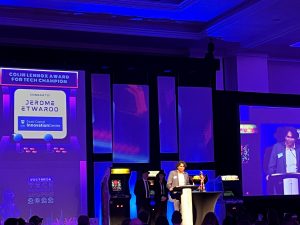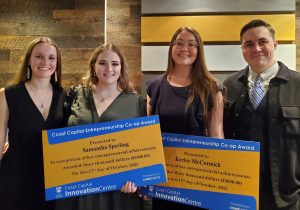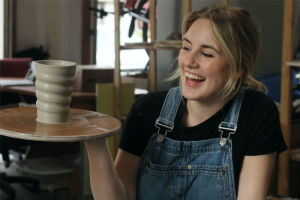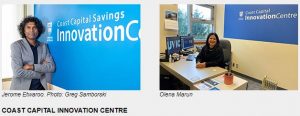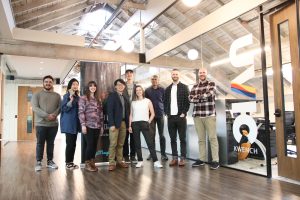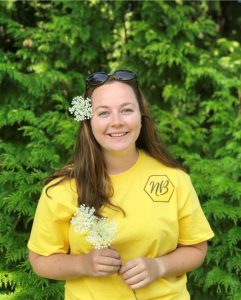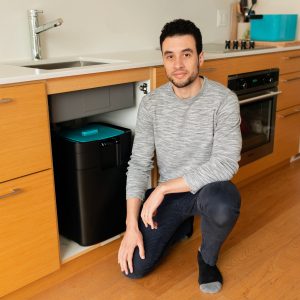Oh, What a Night for CCIC! at the 20th Annual Victoria Tech Community Awards
“This award means everything to me. I work hard every single day not just because I believe in the science that VoxCell is creating but because I truly believe in and trust the hard-working team we have. They are my motivation and inspiration.”
-Dr. Karolina Valente, CEO and CSO, VoxCell, Leader of the Year
On Thursday, Dec 8, 2022, the 20th Annual Victoria Tech Community Awards (previously known as the VIATEC Awards) took place at Victoria Conference Centre’s Carson Hall. This vital and spectacular gala spotlights and celebrates some of the year’s most notable companies and individuals within Victoria’s $4 billion tech sector, the fastest-growing technology region in British Columbia. Always a hot, widely anticipated event, the three-year COVID-related hiatus further amplified the excitement. On all counts, this epic evening delivered the promised “more fun than adults are used to.” The raucous 80s-themed night featured creative challenges, arcade games, a singalong with The Choirs YYJ and Marc Jenkins to A-ha’s Take On Me, and much more with charismatic emcees Kim Persley and Benji Duke from Quiz This.
This year, VIATEC sought to refine the categories and evolve the scope and inclusion of everyone doing leading-edge work in Victoria. To accomplish this, they created a coalition with organizations, including iWIST (Island Women in Science and Technology), the Coast Capital Innovation Centre (UVic’s on-campus venture incubator), CIN (Capital Investment Network), Women’s Equity Lab and Alacrity Canada. The panel of coalition delegates or the audience selected all award recipients. “By inviting the other organizations to help shape the categories and select the recipients, we made room for greater participation. We’ve been told the event was more inclusive, and provided a greater sense of belonging for everyone involved. VIATEC’s mission is to cultivate the most cohesive tech community in the world, and this is another step in that direction,” shared VIATEC CEO, Dan Gunn.
Of the 187 nominations, 59 finalists from 47 companies were selected for the 10 awards categories. CCIC startups won three: Leader of the Year, Growth Company of the Year and Innovative Excellence — Hardware. Of the recognition categories, which are not through nominations, three CCIC individuals won the Social Impact Award, the Inclusion Champion Award and The Colin Lennox Award for Technology Champion. All victors went home with an iconic Russell Papp astronaut trophy.
CCIC finalist MeepMeep was nominated for Startup of the Year with their smart disc-golf accessories. “The nomination came as such a big honour for us and quite a shock to be standing among the giants that we know have been nominated for this award in the past. We are deeply grateful to the team and community around us,” shared CEO Eve Olynyk. Axolotl Bioscience was a finalist for Innovative Excellence – Hardware, and Dr. Stephanie Willerth, CEO and Co-Founder, was also nominated for Leader of the Year. This company advances medicine through innovative bioink technologies that enable 3D printing of humanized tissue models for drug screening applications. Axolotl bioink is derived from all-natural materials and with an environmentally friendly production process. “These nominations reflect the hard work and innovation that our team has been achieving over the past two years,” said Dr. Stephanie Willerth. Sepura, the eco-friendly garbage disposal, was a Product of the Year finalist. Sepura Co-Founder and CEO Victor Nikolov noted, “we were so happy. We’ve put so much work into our product and are about to ship in a couple of months, so it’s great to be nominated for Product of the Year, especially being alongside some really cool products!” Iris Dynamics, developing and manufacturing efficient, intelligent linear electric motors was a finalist for Product of the Year and Employer of the Year. “It means a lot to our whole team to be selected as finalists. We’re a close community at Iris, and we’ve worked very hard together this year, conquering several technical challenges and building an impressive manufacturing facility in Victoria,” stated Kyle Hagen, CTO. Pani Energy CEO Devesh Bharadwaj, was a finalist for Leader of the Year. This company develops economically accessible technologies for clean water and clean energy industries with a cloud-based machine-learning software platform to elevate the efficiency of industrial and city-scale desalination and wastewater treatment plants. Solaires Entreprises Inc. was up for Scale Company of the Year (11-29) and Innovative Excellence – Hardware for their perovskite-based solar inks, revolutionizing solar energy capture. Dr. Sahar Sam, Co-Founder and CSO, shared, “Solaires is focusing on reducing the GHG emissions by developing a new technology. This nomination brings more encouragement to the team to stay focused and move faster towards commercializing our product.” Other CCIC finalists included Origen Air, which creates smart, living air purifiers for Startup of the Year and Product of the Year. Cuboh, a software company that consolidates third-party ordering platforms into one hub for restaurants for Anchor Company of the Year, innovative online auto buying platform VINN for Growth Company of the Year and LetHub, utilizing artificial intelligence to create efficiencies in the property management space, saving time and paperwork for both renters and landlords for Startup of the Year.
Onto the winners. Joni, with Organic & Sustainable Period Care for Everybody, won for
Innovative Excellence – Hardware and the Social Impact Award (Sponsored by: UVIC Innovation Centre). Co-Ceo and Co-Founder Linda Biggs emailed from her women-only trade mission with the Asia Pacific Institute, exploring export options to the Japanese market. “Joni is thrilled to be nominated for our Joni free-vend period care dispenser. Considering that over 30% of the population menstruates, we believe making period care as accessible as toilet paper for businesses and their teams can have a significant positive impact. We’re proud to offer a unique solution that fosters continuous innovation in product development and sustainability and are grateful for the opportunity to share it with the amazing VIATEC community.”
Marine Labs, a global leader in coastal monitoring, provides real-time coastal intelligence from fleets of coastal sensors, transforming marine safety, and building climate resilience. It was a finalist for Growth Company of the Year (Sponsored by: KPMG – LLP), and Dr. Scott Beatty, Founder and CEO was up for Leader of the Year. They won Growth Company of the Year. Dr. Scott Beatty shared that ”winning with the Victoria Tech Community feels amazing. The community is full of vibrant, brilliant and successful tech builders and to be recognized among them is a real honour.”
Sam Mod and the Freshworks team won the Inclusion Champion Award (Sponsored by VanCity). Freshworks takes a fresh approach to building and delivering affordable, efficient software-as-a-service that works for users and everyone on the team.
The Leader of the Year (Sponsored by: AbeBooks) went to VoxCell CEO and CSO Dr. Karolina Valente. VoxCell offers human-Like cancer tissue models and proprietary bioinks for the drug development industry. Their goal is to change how therapies are tested, allowing oncology drugs to reach the hands of people that need them sooner. They were also finalists for Innovative Excellence – Hardware. “As a leader, I aim to create the inspiring vision of what VoxCell will be. To be nominated for this award carries extra weight for me as an immigrant woman. Moving from Brazil to Portugal and then to Victoria, starting a biotech startup company can be a daunting task, especially in a male-dominated industry where the majority of the capital is focused on male-run companies. It can be easy to feel overwhelmed and small at moments. The recognition, I hope, serves as an inspiration to others who feel that they cannot start a company or follow their dream because of gender or immigrant status. It is completely in your power to do so, with hard work and drive and the right team around you.”
Jerome Etwaroo, Director of CCIC, was recognized for his passionate work with The Colin Lennox Award for Technology Champion (Sponsored by: Reed Pope Law Corporation). He stated, ”I am honoured to receive this award. The award confirms that our work at the Coast Capital Innovation Centre plays a key role in our local community. We are proud of the finalists of the 2022 Victoria Tech Community Awards from CCIC and Alumni of the University of Victoria. UVic entrepreneurs are global leaders and play a major role in strengthening the local tech ecosystem.”
What a year and night for recognizing Victoria’s tech sector’s incredible expertise, advances and scope. VIATEC CEO Dan Gunn stated, “CCIC plays a critical role in our region’s innovation ecosystem. Their programs and support provide aspiring innovators and entrepreneurs with vital tools and connections, giving them a critical head start. We’ve been honoured to work with them on our shared interests in supporting and growing our local tech community. Seeing so many of their current and past clients among the finalists for this year’s Victoria Tech Community Awards speaks volumes about the ongoing impact.”
A huge congratulations to everyone nominated and all the winners for your hard work, vision and perseverance. It was an evening to recognize the incredible innovation in the tech community but also to connect, laugh, celebrate and have a heck of a lot of fun. See you next year!
The Coast Capital Innovation Centre has been made possible through a partnership between the University of Victoria and the Coast Capital Federal Credit Union. Since 2016, Coast Capital has committed over $1.5 million to support entrepreneurs and innovators at UVic
Written by Gillie Easdon
.